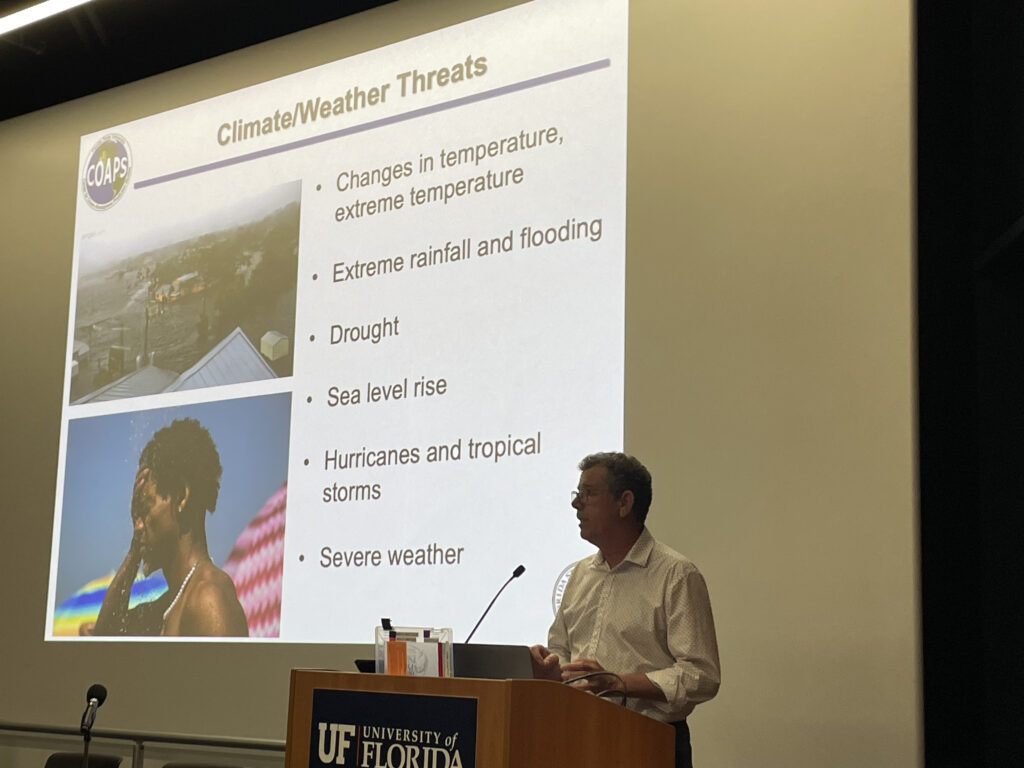By Bella Kubach and Nathan Crabbe, The Invading Sea
Florida saw “really exceptional changes” across the state as the planet experienced the hottest year on record in 2023, State Climatologist David Zierden said Thursday at a summit for climate communicators.
Florida had its hottest month on record in July, only to have the record broken again in August. In Miami, the number of hours with a heat index of 105 or more was three times the previous record. Nearly two months of ocean temperatures above the threshold that leads to coral bleaching caused a massive die-off in Florida’s coral reef.
Zierden described these and other extremes at the 9th Annual Climate Communications Summit at the University of Florida in Gainesville. While he said the El Niño weather phenomenon played a role in the record heat, greenhouse gas emissions are driving continuing increases in global temperatures.

“It’s a grand experiment that humans are doing on this planet and the atmosphere,” he said.
Zierden and other speakers at the summit also described the effects of climate change on rising sea levels and rainfall patterns. There were different extremes in precipitation in different parts of Florida in 2023: Some Southwest Florida cities experienced their driest year on record, while Fort Lauderdale had its wettest year on record due to a massive rain event in April.
David Keellings, a physical geographer at UF, said heavy rain events have become more frequent in the Southeast. Recent decades have seen a big increase in flooding damage, he said, in part due to changes in rainfall that are attributable to human-induced climate change.
Global warming is also causing changes in the Arctic that have consequences in Florida. The melting of ice sheets in Antarctica and Greenland and the thermal expansion of water are increasing sea levels, which UF coastal geographer Katy Serafin said have been rising at an accelerating rate in recent years.
“This isn’t a problem that’s going to go away,” Serafin said. “Sea level is going to continue rising and over the next 30 years we can expect to see almost the amount of sea-level rise that we’ve seen over the last 100 years.”
For Florida, she said, middle-of-the-road predictions put sea-level rise at three to four feet by the end of the century. Flooding in Miami during high tides could occur up to 75 days per year by 2050 and happen daily by 2100, she said.
Zierden cautioned against “doomerism” about climate change rather than reporting about solutions. He noted that the state allocated $235 million in the 2022-23 fiscal year to the Resilient Florida grant program, which funds projects that harden coastal infrastructure and improve drainage and sewage systems.
The governor and his administration have “done a pretty good job … on increasing our resilience,” he said, but “not quite as good” in mitigating the greenhouse gas emissions causing climate change.
Bella Kubach is a Florida Atlantic University senior majoring in multimedia journalism who is reporting for The Invading Sea during the spring 2024 semester. Nathan Crabbe is editor of The Invading Sea. To learn more about what causes sea-level rise, watch the video below.



